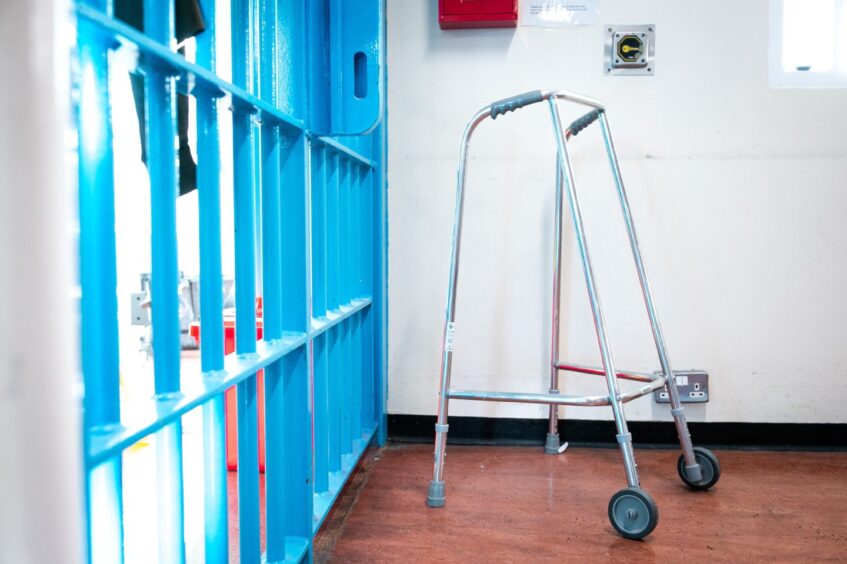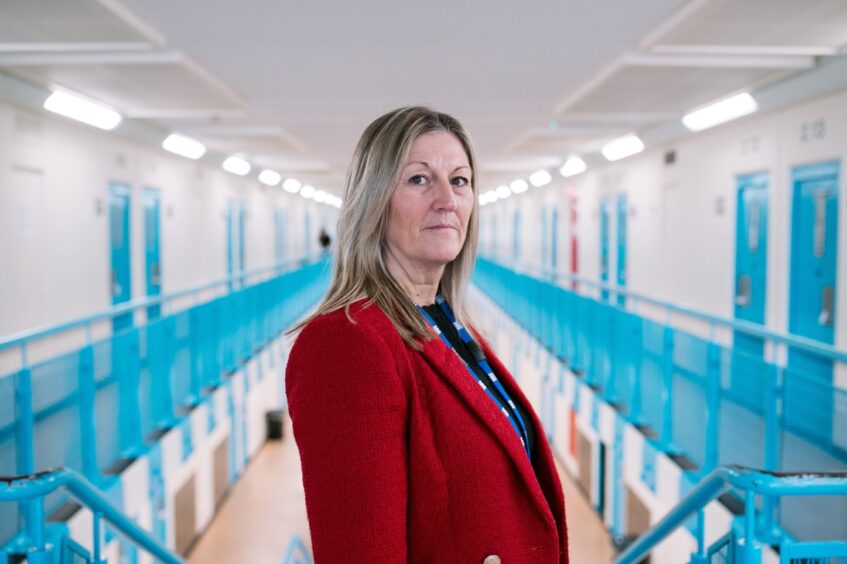
More than £2 million a year is being spent on social care in Scotland’s jails as historical abuse convictions prompt surging numbers of elderly prisoners.
More convictions for sex offences, often committed decades ago, and longer sentences for gangland criminals have resulted in the number of prisoners aged over 50 climb 70% in 10 years.
The changing demographic means more resources for geriatric care, with the cost of external agencies providing 24-hour support behind bars reaching a record £2.3m last year, up from £636,000 just five years ago.
Most, but not all, of the money spent on social care by the Scottish Prison Service (SPS) pays for specialist support for elderly prisoners.
The jails also need adapted, with 65 cells now able to accommodate hospital beds, hoists and oxygen tanks, while communal areas increasingly need to be accessible for wheelchair users.
Other adaptations more common in care homes, such as shower seats, hand rails, fall alarms and magnifying glasses for TV screens, are also needed.
Last month, there were almost 150 prisoners over 70 being held in Scotland with charities like Macmillan Cancer Support and Alzheimer Scotland enlisted to advise on how to care for them.
Fiona Cruickshanks, governor of HMP Edinburgh, joined the SPS 27 years ago. She said: “When I started, you would have an individual needing a wheelchair once in a blue moon and most accessible cells were for young people with a disability.
“However, over the last 10 years or so, the increase in the age profile has been noticeable along with the number of people needing social care and end-of-life care.”
Surge in pensioner prisoners
Across Scotland’s prisons, the number of inmates aged over 55 has risen from 767 in 2012-13 to 1,276 in 2022-23, up almost 70% in a decade. Meanwhile, the number of 70-plus prisoners more than trebled to 201 in the same period.
At Edinburgh’s Saughton jail, Cruickshanks said that means a change in focus for staff away from the management of security, good order, discipline, and risk and more towards managing prisoners’ physical and emotional needs.
That is why, she added, external partner agencies are increasingly needed to provide additional and specialist support. She said: “We will have people who are bed-bound so need hoists to get out of bed and into showers. Carers will help feed, shower and clothe them as our staff are not trained to do that.
“A different type of resource is needed but staff must also be helped to better understand conditions like dementia, for example, and how that might present in a custodial environment and how we can manage that.”
At Saughton, officers try to keep older prisoners together to make their care easier to manage, although most have been jailed for historical abuse and are, in any case, segregated from other prisoners for their own protection.
Last month, the SPS had 1,462 prisoners over 50. Just less than 900 were in their 50s; almost 400 were in their 60s; 124 were 70-something; and 22 were over 80.
The rising numbers of increasingly infirm prisoners is putting pressure on space with, for example, some being unable to get into a top bunk while the need for more scheduled and unplanned visits to hospitals is stretching staff.
Meanwhile, prisoners with a terminal illness in need of end-of-life care are increasingly common and, Cruickshanks said, that can demand unusual visiting arrangement to allow family members to visit prisoners.
She said: “We would never normally think of bringing family members into our accommodation blocks but have had to do that on occasion to allow relatives to spend final moments with a loved one.
“We rely on NHS staff and our carers to guide staff on the practical issues around palliative care.
“A lot of those older prisoners will choose to die here because they will tell you it’s their home. Some will have no family and others will have been disowned by their family so they have nothing and no one to go out to.
“Meanwhile, they may have built up good relationships with the staff and friendships with other prisoners.”
Depending on risk assessments and prognosis, some prisoners may be released to hospices but there are now more deaths from natural causes in prison, which impacts on staff and other prisoners.
Historical sex offenders
The increasing number of prosecutions of men suspected of sexual abuse dating back years has meant many more older sex offenders being jailed.
In 2023, Jim Torbett, 76, the founder of Celtic Boys’ Club, was found guilty of abusing a boy more than 50 years ago and sentenced to three years to be served after an ongoing six-year jail term for abusing another three boys.
Meanwhile, Matthew George, 73, and John Muldoon, 69, who worked at residential school Kerelaw, in Ayrshire, were also jailed last year for a total of 28 years for abusing pupils.
However, longer sentences for serious and organised crime have also put more criminals behind bars for longer.
James McDonald, 49, and Raymond Anderson, 61, were jailed for 35 years – later reduced to 30 years – after murdering Michael Lyons in a gangland gun attack at a garage in north Glasgow in December 2006.
A new sentence available to judges, an Order of Lifelong Restriction when criminals cannot be freed until they are assessed as safe, is also keeping prisoners behind bars longer.
Many prisons are now routinely running at over 100% capacity with officers saying the lack of space is causing increasing problems.
Life inside: Still Game, bowls, bed hoists and dementia
The Still Game mural might have given it away but the three-deep row of wheelchairs and walking frames confirms Hermiston hall in HMP Edinburgh is definitely not for young offenders.
One of four halls at the Saughton jail, Hermiston is where the jail’s most elderly and infirm prisoners are held in a flat section without metal flights of stairs to navigate.
The hall’s other section is for prisoners kept apart for their own protection, but Hermiston Level Two can feel as much like a care home as a jail.
The hall might be barred and locked, just like the others, but some cells have been adapted to take a hospital bed and hoist; the notice board details the times for carpet bowls; and hours each day are needed to distribute the prisoners’ prescribed medication.
It is just before Christmas and there are about 915 prisoners in Edinburgh and 23% are over 50. Most are in their 50s but 61 are 60-something, 15 are in their 70s and seven are over 80. Most of them are held in Hermiston.
Although, one at least remains unclear about that as an officer explains his unfolding dementia means he needs to be told every day where he is and why he cannot leave.
The officer and his colleagues are among the increasing number of Scottish Prison Service staff whose day-to-day work is informed by an awareness of age-related conditions like Alzheimer’s and shaped by the need for skills in social care.
Emma Jardine, of Howard League Scotland, which campaigns for penal reform, said: “It’s high time we looked at whether elderly and infirm prisoners could be accommodated in a less secure and more suitable environment.”

Enjoy the convenience of having The Sunday Post delivered as a digital ePaper straight to your smartphone, tablet or computer.
Subscribe for only £5.49 a month and enjoy all the benefits of the printed paper as a digital replica.
Subscribe © Andrew Cawley
© Andrew Cawley © Andrew Cawley
© Andrew Cawley © Andrew Cawley
© Andrew Cawley